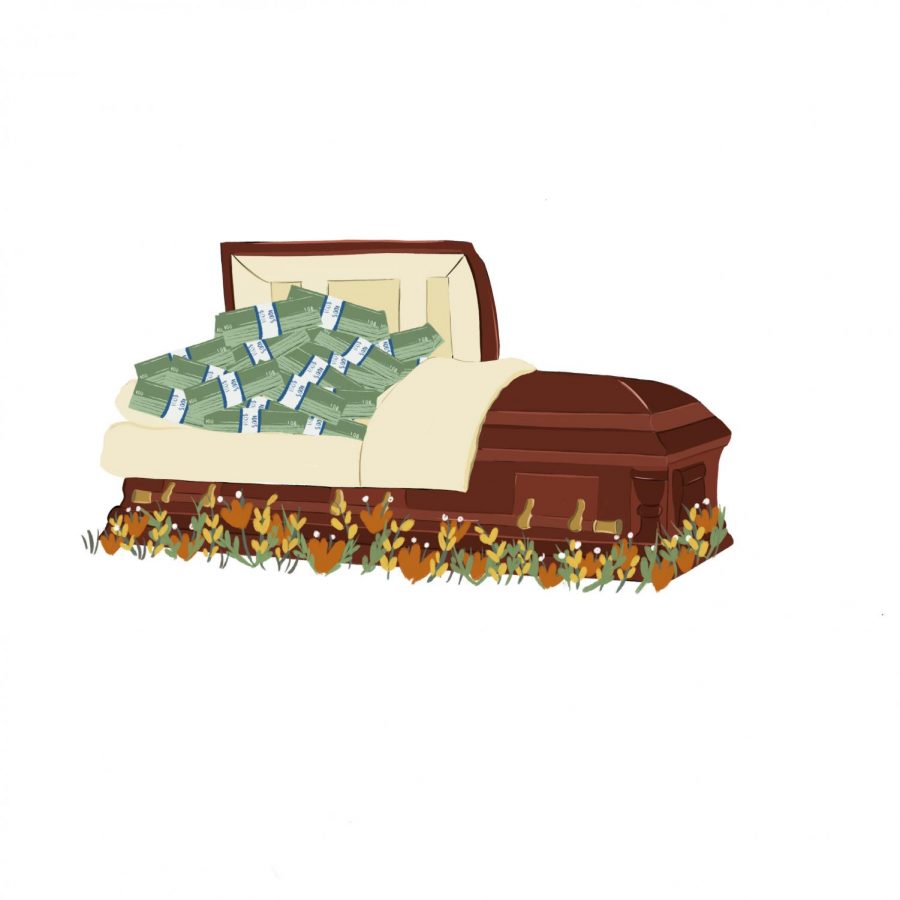OPINION: We need to deal with death
OPINION: We need to deal with death
February 28, 2019
The average funeral cost in 2017 was $7,360, and the funeral industry itself is worth roughly $16 billion, according to the National Funeral Directors Association. These numbers have been increasing for decades, and the least expensive option for death care—direct cremation with no service—will still run most families more than $1,000.
Grieving people are talked into purchasing more expensive caskets, flower arrangements and burial plots. Perhaps those making these sales are well-meaning, but they are a part of a broken system that is inherently flawed. An industry built on a foundation of capitalizing on the desire of grieving families to honor their deceased loved ones cannot be just. But the industry continues on because of one honest reality: We will all die, and the longer we ignore that, the more we can be charged.
We cannot challenge the exorbitant costs of funerals and cremations without also confronting our relationship with death.
Our culture is terrified of death, and our funeral system reflects that. We embalm bodies so that they appear to be asleep, we dress them in their best clothes and lock them in silk-lined boxes that will do nothing to prevent them from decomposing. This all seems innocuous enough, but it is nothing more than a show. Jaws are sewn shut with wires, veins are drained of blood and pumped with chemicals, organs are removed so they don’t smell, clear bodysuits are worn under clothing to prevent leakage. All this is to avoid, at all costs, the appearance of death.
Because information about the realities of the funeral process are largely kept from all but the most curious and morbid members of the public, we lull ourselves into the belief that this spectacle is the best way to show respect to our dead. As a society, we fundamentally believe corpses should be treated with dignity. But an honest look at the mainstream funeral industry reveals that we treat our dead like puppets for the sake of our own comfort. We shell out thousands upon thousands of dollars, willingly, because we refuse to look at the reality of mortality.
There was a time—which still exists as the norm in many cultures outside of the West—when the dead were cared for at home, gently and lovingly cleaned by those who cared for them in their last days. Bodies were wrapped in simple shrouds, grieved and buried without caskets. They were allowed to decompose in the soil, to become in death a critical part of the ecosystem they lived in.
Now, this practice of caring for our own dead is seen as taboo, gross and even dangerous, despite the fact that the World Health Organization notes dead bodies do not put the living at risk unless they died from a highly infectious disease. Though there are no laws prohibiting families from caring for their own dead, it has become a cultural norm to leave that work to strangers. By doing this and continuing to support the funeral industry, we choose to pretend our loved ones have not died until we are forced to grapple with it. We choose to keep a comfortable distance between our homes and our mortality. This distance is a disservice to our loved ones who have passed and to those who come after them. The funeral industry will never change until our relationship with death changes first.


